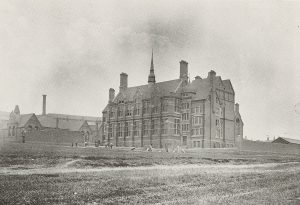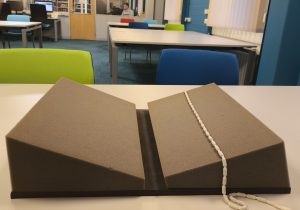October 31, 2024, by Chloe
Exploring the Archives: A summer placement at Manuscripts and Special Collections
This is a guest post by Arwen Jenkins, a University of Nottingham student, who recently completed a Summer Research Placement at Manuscripts and Special Collections.
How does working in archives and with manuscripts go when you’ve had no prior experience? For so many humanities students, analysing and exploring primary sources are essential parts of our degrees. Yet, ironically, we never seem to handle them in real life, only reading what’s on our screens to try and craft the ideal gobbet essay. This meant having the opportunity to be able to handle materials in person was something I jumped at, yet also found slightly daunting as I had no idea what I was getting myself into.
I had a research placement through the Faculty of Arts at the university’s Manuscripts and Special Collections department over the summer lasting four weeks. This was the perfect amount of time to navigate and harness my new skills in archives and handling research material. This was what I was most looking forward to as I am a history buff I was really excited to be handling documents all the way back till the 1600s! I was nervous on how to handle the materials, but luckily on our second day we met with the conservator in the department who gave us training on how to analyse the documents and care for them properly, using foam supports and snake weights to look at the sources. This boosted my confidence, as although I was excited to look at the materials, in the back of my head was a slight fear I would somehow damage the documents!
My research focused on punishments in education from the 17th– century to the present day, using an excel spreadsheet to record our research to fit the scope of our survey. The intention of our research was to create an exhibition on punishments in education, looking at the impact it has on children’s mental health, with the materials we have researched being on display in Lakeside Arts in the coming years. This meant we had the challenge of going through materials that had any associations with education or punishments, having to decide whether they were relevant for the exhibition, based on their content and visually engaging. This was difficult at times, as the scope was so broad it sometimes felt unfair to label valuable sources as unfitting even when they were interesting in many regards but did not fit the brief. However, the broad range also meant we were lucky enough to be able to look at such a wide variety of sources, from different time periods and different types of written sources which meant there was always something new and exciting to explore.

The project involved consulting many different items from archives and special collections, including this late 19th century prospectus for High Pavement School, from which this photograph of the school comes.
This internship evolved my research skills, being able to apply what I had already developed in my degree on a practical level which was brilliant work experience to have but also very exciting to be involved in. Placements are such a brilliant way of applying your university skills in real life, as well as guiding you for your future career. Doing this placement has helped me narrow down what I want to do after university, as I really enjoyed the analytical and creative parts of the placement, and also realised that the social element of a career was really important to me. Working in archives for the first time was exciting for me to put my university skills to use and have the chance to work in an office environment which I hadn’t had the chance to do before!
If you’d like to carry out some research of your own, feel free to visit our Reading Room – to find out more, or to book an appointment today, please contact us at mss-library@nottingham.ac.uk.
No comments yet, fill out a comment to be the first


Leave a Reply